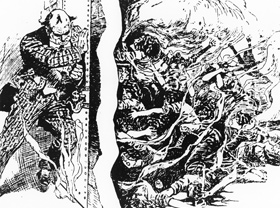Indictments in the Asch Fire Case
The Outlook, April 22, 1911. p.851.
Last week the Grand Jury of New York found indictments against the proprietors of the Triangle Waist Company, Issac Harris and Max Blanck. These two men constitute the firm who employed the factory operatives of whom 143 lost their lives in the terrible disaster in Washington Place, New York, on March 25.
The indictments against them are for manslaughter in the first and second degree, and they are based, so the District Attorney states, on what he believes to be strong evidence that some at least of the doors through which the girls might have escaped were habitually kept locked and were locked at the time of the fire.
The law requires that doors in such a factory shall open outwardly where practicable, and shall not be locked, bolted, or fastened during working hours.
The evidence before the coroner's jury has been conflicting on this point, but the Grand Jury, it is asserted, had before it a fragment of a tightly locked door.
Meanwhile, Mr. Whitman, the District Attorney, laid before the Grand Jury the testimony of witnesses who stated that the doors on the Washington Place side of the building were kept locked, and the Italian Consul is reported to have taken affidavits of many Italian girls who swore that the Washington Place doors were locked and never used for exit.
It is further asserted that it is capable of proof that two girls in particular lost their lives directly because these doors were locked.
We need not point out that the men accused are entitled to a suspension of opinion until they are actually tried. Whatever may be the facts in this case, there is considerable evidence that it is deplorably common custom for doors in similar establishments to be locked.
Immediately after the fire The Outlook quoted from the report of a special committee made up from the Cloakmakers' Union and the Cloak Manufacturers' Association. It stated that they had found twenty-two shops in which the doors leading to the hall and stairways were locked during the day, while other provisions of law were constantly violated in a much larger number of shops.
The continuance of public interest in this matter and the wide discussion of proper legal regulation of conditions in factories and other crowded buildings in New York City form an encouraging sign that the public is in earnest and will not be satisfied with less than a thorough overhauling of the laws and the provision of an ample force of inspectors.
What can be done by voluntary efforts was seen last week when in a New York factory not unlike the Asch shop an alarm of fire very nearly caused a panic which might easily have proved fatal had it not been that the forewoman of the shop had herself organized and frequently practiced a fire drill, and by her prompt orders got the girls into line and out of the building with no injury whatever.

